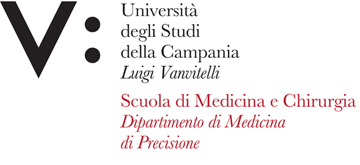Maria Luisa BALESTRIERI
Insegnamento di CHIMICA
Corso di laurea magistrale a ciclo unico in MEDICINA E CHIRURGIA (Sede di Napoli)
SSD: BIO/10
CFU: 6,00
ORE PER UNITÀ DIDATTICA: 60,00
Periodo di Erogazione: Primo Semestre
Italiano
| Lingua di insegnamento | ITALIANO |
| Contenuti | Il corso si propone di fornire allo studente le conoscenze teoriche essenziali in chimica e propedeutica biochimica e gli strumenti necessari per gli studi successivi del corso di laurea in Medicina e Chirurgia. |
| Testi di riferimento | -Chimica e Propedeutica Biochimica, Bettelheim Brown Campbell Farrell, Casa Editrice, EdiSES |
| Obiettivi formativi | - Comprensione delle leggi fondamentali che governano la materia e le sue trasformazioni. |
| Prerequisiti | Conoscenze di chimica necessarie per superare i test di ingresso al CdS in Medicina e Chirurgia. Conoscenza degli elementi di base di matematica e calcolo. Lo studente che accede al corso di Chimica e Propedeutica Biochimica deve aver conseguito una preparazione di base in Chimica generale e organica. Al fine di uniformare le conoscenze di base saranno introdotti i concetti fondamentali prima di passare a quelli più complessi. |
| Metodologie didattiche | Lezioni frontali ed esercitazioni pratiche integrate. Le lezioni saranno suddivise in tre parti. Una breve introduzione per riprendere gli argomenti svolti nella lezione precedente, risposte a domande sugli argomenti svolti e presentazione nuovi argomenti. |
| Metodi di valutazione | La valutazione della competenza dello studente si basa sia su prove scritte che orali. La prova scritta consiste in esercizi e domande aperte che mirano a valutare la capacità dello studente di applicare le leggi della chimica generale, i meccanismi di reazione della chimica organica e le conoscenze di base della teoria della chimica generale e organica. L'esame scritto comprende domande ed esercizi di calcolo che riguardano gli aspetti fondamentali della chimica generale e organica, nonché i principali aspetti del concetto di mole, calcoli stechiometrici, proprietà delle soluzioni con particolare riguardo ai metodi per esprimere la concentrazione, caratteristiche delle soluzioni acquose di elettroliti, proprietà colligative, nomenclatura ufficiale dei composti chimici organici e inorganici, leggi che regolano l'equilibrio chimico e le velocità di reazione, reazioni acido-base e di neutralizzazione, concetti di termodinamica, struttura, proprietà e meccanismi di reazione delle più importanti classi di composti organici, con approfondimenti speciali su quelli di interesse biologico. Per poter superare la parte scritta dell'esame e accedere alla prova orale, lo studente deve ottenere un punteggio di 18/30. L'esame orale copre tutti gli aspetti della teoria della chimica generale e organica. Lo studente dovrebbe essere in grado di discutere sull'argomento e dimostrare capacità di collegamento delle conoscenze acquisite. Il voto finale è espresso in 30/30 si stabilisce durante la prova orale mentre la prova scritta dà solo accesso alla parte orale dell'esame. |
| Altre informazioni | Sarà condiviso in forma elettronica il materiale utilizzato per le lezioni frontali e le esercitazioni. |
| Programma del corso | -Composizione della materia. Elementi e composti. Atomi. Simboli e formule. Sostanze e miscele. Molecole. Formula empirica e molecolare. Struttura e forma delle molecole. |
English
| Teaching language | ITALIAN |
| Contents | The course aims to provide the student with the essential theoretical knowledge in chemistry and biochemical propaedeutics and the tools necessary for subsequent studies of the degree course in Medicine and Surgery. |
| Textbook and course materials | -Chimica e Propedeutica Biochimica, Bettelheim Brown Campbell Farrell, Casa Editrice, EdiSES |
| Course objectives | -Understanding of the fundamental laws that govern matter and its transformations. |
| Prerequisites | Knowledge of chemistry needed to pass the admission tests to the Degree in Medicine and Surgery. Knowledge of the basic elements of mathematics and calculation. The student who accesses the Biochemistry Chemistry and Propaedeutics course must have obtained a basic preparation in General and Organic Chemistry. In order to standardize the basic knowledge, the basic concepts will be introduced before moving on to the more complex ones. |
| Teaching methods | Lectures and integrated practical exercises. The lessons will be divided into three parts. A brief introduction to resume the topics covered in the previous lesson, answers to questions about the topics covered and presentation of new topics. |
| Evaluation methods | The evaluation of the student's competence is based on both written and oral tests. The written test consists of exercises and open questions aimed at assessing the student's ability to apply the general chemistry laws and reaction mechanisms of organic chemistry and the basic knowledge of general and organic chemistry theory. The written exam includes questions and calculation exercises concerning the fundamental aspects of general and organic chemistry, as well as the main aspects of the concept of mole, stoichiometric calculations, properties of the solutions with particular regard to methods for expressing concentration, characteristics of aqueous solutions of electrolytes, colligative properties, official nomenclature of organic and inorganic chemical compounds, laws that regulate chemical equilibrium and reaction rates, acid-base and neutralization reactions, concepts of thermodynamics, structure, properties and reaction mechanisms of the most important classes of organic compounds, with special insights on those of biological interest. In order to pass the written part of the exam and access the oral exam, the student must obtain a score of 18/30. The oral exam covers all aspects of general and organic chemistry theory. The student should be able to discuss the topic and demonstrate the ability to link the acquired knowledge. The final score is expressed in 30/30 and is established during the oral examination while the written test gives only access to the oral part of the exam. |
| Other information | The material used for the lectures and exercises will be shared electronically. |
| Course Syllabus | -Composition of matter. Elements and compounds. Atoms. Symbols and formulas. Substances and mixtures. Molecules. Empirical and molecular formula. Structure and shape of molecules. |








